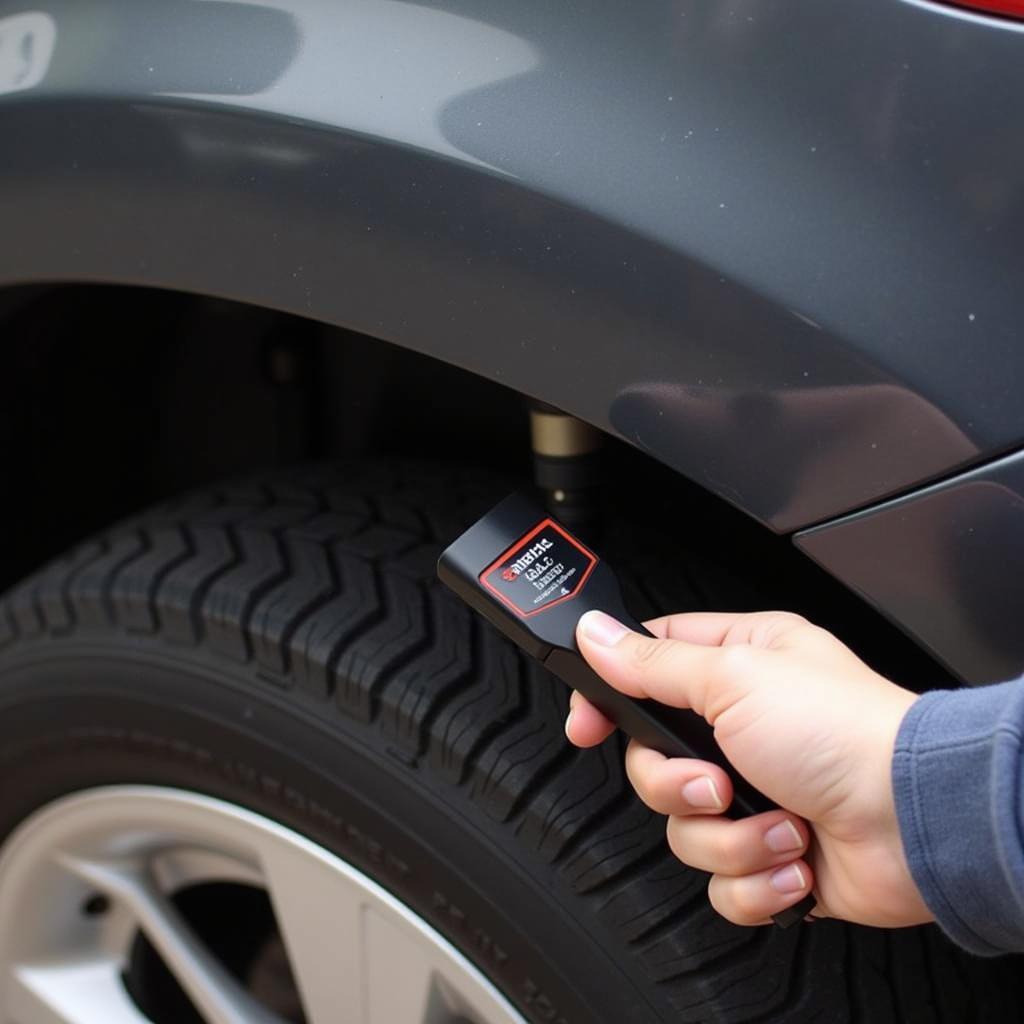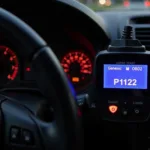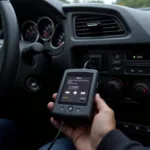Eco OBD2 scanners are small devices that plug into your car’s OBD2 port, promising to improve fuel efficiency and reduce emissions. They sound almost too good to be true, leading many car owners to wonder: do eco OBD2 scanners actually work? This article delves into the technology, benefits, and potential drawbacks of these devices to help you make an informed decision.
Understanding OBD2 Scanners and Fuel Optimization
Before we assess the effectiveness of eco OBD2 scanners, it’s crucial to understand how traditional OBD2 scanners work and the factors influencing fuel efficiency.
A standard OBD2 scanner acts as a window into your car’s engine control unit (ECU), retrieving diagnostic trouble codes (DTCs), and real-time data on various engine parameters like:
- Engine speed
- Coolant temperature
- Oxygen sensor readings
- Throttle position
This information helps mechanics diagnose issues and optimize engine performance.
Fuel efficiency, however, is a complex equation involving driving habits, vehicle maintenance, and environmental factors.
How Eco OBD2 Scanners Claim to Work
Eco OBD2 scanners claim to optimize fuel consumption by modifying the ECU’s parameters. They typically function by:
- Monitoring driving habits: The device collects data on your acceleration, braking, and speed.
- Adjusting fuel-air mixture: Based on the collected data, the eco OBD2 scanner supposedly fine-tunes the fuel-to-air ratio for combustion.
- Optimizing ignition timing: The device might adjust the timing of the spark plugs to ignite the fuel-air mixture more efficiently.
Evaluating the Claims: Do Eco OBD2 Scanners Deliver?
While manufacturers often make bold claims about fuel savings of up to 15-20%, independent studies and consumer reviews present a mixed bag.
Arguments for Eco OBD2 Scanners:
- Potential for minor improvements: Some users report slight improvements in fuel economy, especially with older vehicles with less sophisticated ECUs.
- Driving habit feedback: The data logging feature can promote more fuel-efficient driving habits.
Arguments against Eco OBD2 Scanners:
- Limited impact on modern cars: Modern vehicles already have highly optimized ECUs, leaving little room for improvement by aftermarket devices.
- Lack of scientific evidence: Most claims lack robust scientific backing and rely heavily on anecdotal evidence.
- Potential for vehicle damage: In rare cases, tampering with ECU settings can lead to engine problems or void your vehicle’s warranty.
Making Informed Decisions about Eco OBD2 Scanners
Before investing in an eco OBD2 scanner, consider the following:
- Vehicle age and model: Older cars with basic ECUs might see a marginal benefit, while modern cars are unlikely to experience noticeable changes.
- Realistic expectations: Don’t expect drastic fuel savings. Focus on the potential for minor improvements and driving habit feedback.
- Reputable brands: Choose devices from reputable manufacturers with transparent product information and customer reviews.
“It’s important to remember that an eco OBD2 scanner is not a magic bullet for fuel efficiency,” says automotive expert John Smith, a certified mechanic with over 20 years of experience. “While they might offer minor benefits in some cases, the best way to improve fuel economy remains regular vehicle maintenance and adopting fuel-efficient driving habits.”
Conclusion
The effectiveness of eco OBD2 scanners in significantly improving fuel economy remains debatable. While they might offer minor benefits, particularly for older vehicles, their impact on modern cars is likely negligible. Instead of relying solely on such devices, focus on proven methods like regular maintenance and conscious driving to maximize your fuel efficiency.
FAQs about Eco OBD2 Scanners
1. Are eco OBD2 scanners compatible with all cars?
Eco OBD2 scanners are generally compatible with gasoline vehicles manufactured after 1996 that have an OBD2 port. However, it’s crucial to check the device’s compatibility with your specific car model before purchasing.
2. Will using an eco OBD2 scanner void my car’s warranty?
In some cases, tampering with the ECU settings might void your car’s warranty. It’s advisable to consult with your car dealer or manufacturer before installing any aftermarket devices.
3. Can I remove the eco OBD2 scanner after installation?
Yes, eco OBD2 scanners are generally easy to install and remove. Your car’s ECU should revert to its original settings after the device is unplugged.
4. Are there any risks associated with using eco OBD2 scanners?
While generally considered safe, using an incompatible or poorly designed eco OBD2 scanner might potentially harm your vehicle’s engine or ECU. Always choose reputable brands and consult with a mechanic if you have any concerns.
5. What are some other ways to improve my car’s fuel efficiency?
Proven methods for improving fuel efficiency include regular car maintenance, maintaining correct tire pressure, reducing unnecessary cargo weight, and adopting fuel-efficient driving habits like smooth acceleration and anticipating traffic flow.
For more information on OBD2 scanners and car diagnostics, you can explore these related articles:
- E36 OBD2 Keyless Entry in OBD1
- E36 OBD1 and OBD2 ECU Connector the Same
- OBD2 Scanner for Specific Car
Need further assistance with eco OBD2 scanners or car diagnostics? Don’t hesitate to contact our expert team via WhatsApp: +1(641)206-8880, or Email: [email protected]. We’re available 24/7 to address your queries.


